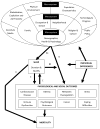Mortality associated with short sleep duration: The evidence, the possible mechanisms, and the future
- PMID: 19932976
- PMCID: PMC2856739
- DOI: 10.1016/j.smrv.2009.07.006
Mortality associated with short sleep duration: The evidence, the possible mechanisms, and the future
Abstract
This review of the scientific literature examines the widely observed relationship between sleep duration and mortality. As early as 1964, data have shown that 7-h sleepers experience the lowest risks for all-cause mortality, whereas those at the shortest and longest sleep durations have significantly higher mortality risks. Numerous follow-up studies from around the world (e.g., Japan, Israel, Sweden, Finland, the United Kingdom) show similar relationships. We discuss possible mechanisms, including cardiovascular disease, obesity, physiologic stress, immunity, and socioeconomic status. We put forth a social-ecological framework to explore five possible pathways for the relationship between sleep duration and mortality, and we conclude with a four-point agenda for future research.
Copyright 2009 Elsevier Ltd. All rights reserved.
Figures

References
-
- Youngstedt SD, Kripke DF. Long sleep and mortality: rationale for sleep restriction. Sleep Med Rev. 2004 Jun;8(3):159–174. - PubMed
-
- Kripke DF, Simons RN, Garfinkel L, Hammond EC. Short and long sleep and sleeping pills. Is increased mortality associated? Arch Gen Psychiatry. 1979 Jan;36(1):103–116. - PubMed
-
- Wingard DL, Berkman LF. Mortality risk associated with sleeping patterns among adults. Sleep. 1983;6(2):102–107. - PubMed
MeSH terms
Grants and funding
LinkOut - more resources
Full Text Sources
Medical
Research Materials

